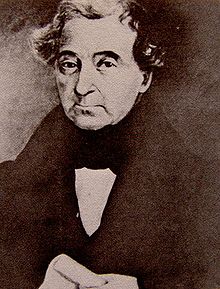- Jean Baptiste Richardville
-
Jean Baptiste de Richardville (c. 1761–13 August 1841), also known as Peshewa ("Wildcat") and Joseph Richardville, was the last chief of a united Miami tribe.
Contents
Biography
He was born in the village of Kekionga, present-day Fort Wayne, Indiana, to a French merchant named Joseph Drouet de Richerville and Tacumwah, sister of the Miami chief Pacanne. He was well educated, and could speak Miami, Iroquois, French, and English, although he later refused to speak white languages or wear white clothing.[1]
The main source of income for Richardville's family was the fur trade and control of a portage connecting the Maumee River to the Little River, known today as the Little Wabash River. The Northwest Ordinance declared that all important portages could be used freely, and the Miami lost control of the portage in the Treaty of Greenville. However, Richardville acquired a trade license in 1815 which gave him a monopoly on carry-over services at the portage, and the family again made profits from the portage.[2]
In 1818, Richardville signed the Treaty of St. Mary's. The treaty punished the Miami for their lack of support during the War of 1812, and took away most of central Indiana.[3] However, Richardville negotiated legal land grants to individual Miami families, and often offered his private lands as a refuge for other Miami. This allowed about half of the Miami people to remain in Indiana when the tribe was officially removed in 1846, five years after Richardville’s death.[4]
After signing the Treaty of Mississinwas, Richardville lived in the Richardville House, in Fort Wayne, Indiana. The federal government donated $600 to the building, which was a stipulation of the treaty. Richardville used his own funds towards the house, and in 1827 it became the first Greek Revival house in Indiana.[5]
Richardville is considered to have been the richest man in the state of Indiana at the time of his death in 1841. He was succeeded by his eldest daughter's husband, Francis La Fontaine.[6] The Richardville house remained in the family until 1894. The land around it was mined for gravel in the 20th century. In 1991, the house was acquired by the Allen County-Fort Wayne Historical Society, which has restored the remaining property.
Named in his honor
- Richardville County, Indiana (Later re-named to Howard County)
- Richardville, Indiana (Mis-spelled as Russiaville to today)
References
- Anson, Bert. The Miami Indians. ©2000. University of Oklahoma Press. ISBN 0-806-13197-7.
- Carter, Harvey Lewis. The Life and Times of Little Turtle: First Sagamore of the Wabash. ©1987, Urbana: University of Illinois Press. ISBN 0-252-01318-2.
- Edmunds, R. David. "Jean Baptiste Richardville". Encyclopedia of North American Indians, 549–550. Ed. Frederick E. Hoxie. Boston: Houghton Mifflin, 1996. ISBN 0-395-66921-9.
- Poinsatte, Charles (1976). Outpost in the Wilderness: Fort Wayne, 1706-1828. Allen County, Fort Wayne Historical Society.
- Durand, Bruno. "Les Drouet de Richarville, colons du Québec et de l'Amérique". Bulletin de la Société Historique de Dourdan (France), n° 46 (dec 2003) p.3 to 29. ISSN 0248-9392.
External links
Categories:- 1761 births
- 1841 deaths
- American people of French descent
- Native American leaders
- Miami tribe
- American politician stubs
- Indigenous peoples of North America stubs
Wikimedia Foundation. 2010.

